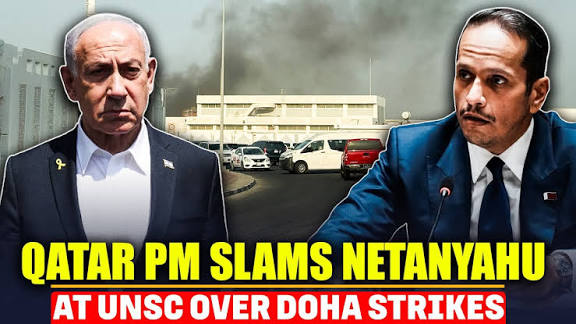Netanyahu’s Qatar Strike: Strategic Breakthrough or Diplomatic Disaster

Israel defended its decision to mount the attack. Qatar has played an important role in broketing diplomatic efforts to end the Israeli-Gaja war. Today we will discuss about Netanyahu’s Qatar Strike: Strategic Breakthrough or Diplomatic Disaster
Netanyahu’s Qatar Strike: Strategic Breakthrough or Diplomatic Disaster
On 9 September 2025, Israeli forces carried out an airstrike in Doha, Qatar targeting Hamas political leadership The operation — unprecedently striking at the leadership of Hamas on Qatari soil — has triggered a wave of diplomatic fallout, regional alarm, and debate over whether it signifies a bold strategic move or a grave diplomatic blunder. This article analyzes the what, why, and now-what of the strike: its strategic goals, the risks it entailed, the actual consequences, and what the longer-term implications might be for Israel, Qatar, the U.S., and regional stability.
1. What Happened

The Strike
The target was the Hamas political leadership located in Doha. Various sources suggest they were meeting to consider a U.S.-backed ceasefire proposal.
The strike reportedly killed five lower-level Hamas members and a Qatari security officer. The senior Hamas figures appear to have survived.
Israel has taken full responsibility, calling it a “wholly independent operation.” Prime Minister Benjamin Netanyahu warned that nations “harbouring terrorists” must expel or prosecute such individuals, else face consequences.
The Context
Qatar has played a major role as mediator in ceasefire talks between Israel and Hamas. It has hosted Hamas political figures and has been involved in brokering hostage releases.
The strike occurred at a moment when diplomatic efforts were ongoing. Israel’s leadership appears to have calculated that Hamas rejecting a proposal (or stalling) created an opening to hit leadership in exile.
2. Strategic Objectives: What Netanyahu Likely Sought
To assess whether this was a strategic breakthrough or a misstep, we need to understand what Netanyahu hoped to achieve.
Neutralize Hamas Leadership: By targeting external leadership (outside Gaza), Israel hoped to degrade Hamas’ political-diplomatic operations, especially those in exile who are less constrained by the violence inside Gaza. Removing or injuring leadership might reduce Hamas’ ability to negotiate or coordinate.
Send a Message of Resolve: The strike signals to Hamas, to supporting nations, and to the region: Israel is willing to act beyond Gaza’s borders, even violating norms of sovereignty when it deems necessary. This could be intended to deter external support or sanctuaries for Hamas.
Dominate Political Narratives Domestically: Within Israel, there is political pressure (especially from the hard-line parts of Netanyahu’s coalition) to show strength, to avoid appearing weak in the face of continued attacks and hostage issues. A bold strike abroad might bolster his image among these constituencies.
Disrupt Ceasefire Negotiations if They Are Unfavorable: If the proposed terms of ceasefire (including hostage exchange, prisoner releases) were judged too lenient or politically costly, then hitting leadership could be a way to raise the stakes, reset the negotiation dynamic more in Israel’s favor, or simply derail negotiations altogether in favor of a purely military approach.
3. The Risks: Sovereignty, Diplomacy, Strategic Overreach
Striking inside a sovereign state, especially one that serves as a mediator and ally of the United States, carries considerable risks.
Violation of Sovereignty: The act is seen by Qatar (and many international actors) as a breach of international law and norms. Bombing in Doha undermines legal norms about respecting state sovereignty.
Harming Mediator Credibility: By attacking in Qatar, Israel risks undermining Qatar’s willingness and capability to mediate future talks. If mediators feel unsafe, or that their territory can be struck, they might pull back or lose legitimacy.
Diplomatic Backlash: The strike has provoked condemnation from Qatar, from across the Arab world, and raised tensions with the United States. Qatar called it “cowardly” and a violation. President Trump (of the U.S.) expressed that such a strike “does not advance Israel or America’s goals” and said he was informed “too late.”
Risk to Hostage Diplomacy: There are serious concerns that this strike could endanger hostages still held by Hamas. With negotiations in flux, strikes on negotiators or meeting locations risk provoking retaliation or hardening of positions.
Unintended Regional Destabilization: Such actions could inflame resentment in the Gulf; lead to greater regional polarization; push Qatar and others toward stronger alignment against Israel; complicate U.S. alliances; provoke non-state actors; even increase the risk of counterattacks or escalation. Possibility of Failure to Hit High-Value Targets: As it turned out, the senior Hamas leaders reportedly survived. Acting on imperfect intelligence or risking collateral casualties with limited gain might harm Israel’s credibility and strategic position.
4. What Actually Happened – Consequences and Immediate Fallout
Now that the dust has settled somewhat, what have been the actual ramifications to date?
Diplomatic Fallout
Qatar has vehemently condemned the strike. It has called it a violation of its sovereignty and international law.
Qatar’s Prime Minister warned that Israel’s actions destroyed hope for freeing hostages, and called for a regional response.
Arabic and wider Muslim-majority nations have expressed solidarity with Qatar and condemnation of Israel. There is a growing sense of betrayal among regional partners.
U.S. Reaction
The U.S. appears caught in a delicate position: while historically allied with Israel and supportive of some of its security concerns, Washington publicly stated displeasure. President Trump said he was “very unhappy” with the attack.
The U.S. sought damage control—reaching out to Qatari leadership, emphasizing the importance of the relationship, and reiterating that the attack does not align with broader U.S. aims.
There are indications this may strain U.S.-Israel coordination if trust diminishes. Partners in the Gulf may see the U.S. as either complicit or unable to restrain Israel’s more unilateral moves.
Strategic and Military Outcomes
Did Israel get its target? No clear evidence has emerged that the senior Hamas leadership meeting in Doha was killed. Most reports say they survived.
The military achievement is therefore mixed: tactical success in striking a location and sending a message; strategic failure in not neutralizing the intended leadership.
Regional Stability and Future Mediation
Ceasefire negotiations and mediated talks risk being compromised. Mediators like Qatar may find it hard to function if they feel targeted or undermined. The credibility of offers, or trust among parties, could diminish.
Gulf states are reassessing their awareness of security guarantees—especially with respect to the U.S. role and whether alliance with the U.S. shields them from such strikes.
5. Strategic Breakthrough or Diplomatic Disaster?
Putting together the objectives, risks, and outcomes, where does this event lie on the spectrum between breakthrough and disaster?
Arguments for Strategic Breakthrough
Psychological leverage: The strike asserts Israeli capability and willingness to reach across borders. For hardliners and internal political audiences, this projects strength and resolve.
Potential deterrence: Hamas and similar organizations outside Gaza might become more cautious about safe havens; states hosting them may consider the diplomatic risk of being seen as harboring “terrorists.”
Negotiation repositioning: If the strike serves to force Hamas to take ceasefire proposals more seriously, or to pressure external mediators, it might shift dynamics in Israel’s favor.
Arguments for Diplomatic Disaster
Loss of international goodwill: Countries that had sympathy or were neutral or supportive may now see Israel’s actions as reckless invocations of force overriding diplomatic norms. This can reduce Israel’s soft power.
Strained alliances: U.S.-Israel relations may suffer, especially if U.S. perceives lack of communication or coordination. Regional partners may resent what they see as impunity in violating sovereignty.
Undermined mediation and peace prospects: If mediators aren’t trusted, ceasefire deals may collapse, hostage negotiations may stall, and conflict may prolong or intensify.
Risk of escalation: Retaliation, regional responses, or even broader conflict become more likely.
Given the outcomes so far — leadership survived, diplomatic backlash strong, mediation efforts endangered — the balance seems to tip somewhat toward this being more of a diplomatic and strategic risk than a clear win. A “breakthrough” would require measurable advantages in security or diplomatic leverage; so far, those are limited.
6. Longer-Term Implications
Looking ahead, what are the likely consequences if current trends continue? And what should various actors do to manage the fallout?
For Israel and Netanyahu
Political legitimacy at home: A hard-line constituency may back Netanyahu for defying norms and projecting strength. But others (moderates, civil society) may criticize the cost: international isolation, risks to civilians, moral and legal questions.
Security vs. diplomacy trade-offs: Israel may face more limited space for diplomacy; each future negotiation may demand stronger guarantees or more oversight.
For Qatar
Mediator role under threat: Qatar’s ability to act as neutral and safe mediator is now questioned. Unless reassurances are provided, or unless Israel offers certain guarantees, Qatar may be less willing to host or facilitate such negotiations.
Domestic and regional positioning: Qatar might boost its diplomatic heft by rallying Arab and Islamic states in condemning what it views as a violation of sovereignty. It may seek reparations, international legal support, or stronger alliance with actors critical of Israel.
For the United States
Credibility and alliance management: The U.S. must balance support for Israel with preserving relations with Gulf states. Trust that the U.S. can protect or restrain its allies will be tested.
Diplomatic leverage: If the U.S. cannot manage or reduce escalation, its broader regional strategies (normalization with Israel, containing Iran, stability in Gulf) may suffer.
- Regional Order and Norms
Sovereignty norms stressed: The strike challenges the idea that sovereign states, even strong ones, are safe from foreign strikes when they host non-state actors. This could set precedents, alert neighbor states, and possibly trigger realignments.
Mediator safety and effectiveness: If mediators are not secure, peace negotiations across the region may become more difficult.
7. What to Monitor Moving Forward
To see how this plays out — whether it becomes a turning point or a cautionary tale — observers should watch:
Hostage negotiations: Whether remaining hostages are released, and whether the strike influences Hamas’s stance.
Ceasefire proposals: If the U.S.-brokered proposals survive, collapse, or get renegotiated under tougher terms.
Qatar’s response: Diplomatic, legal, or perhaps strategic (e.g., aligning more with actors critical of Israel, altering its mediation role).
U.S.-Israel diplomatic alignment: Whether further coordination occurs, or whether cracks widen — especially in arms, policy, or public statements.
Regional Arab/Gulf reactions: Whether collective
How useful was this post?
Click on a star to rate it!
Average rating 0 / 5. Vote count: 0
No votes so far! Be the first to rate this post.
About the Author
usa5911.com
Administrator
Hi, I’m Gurdeep Singh, a professional content writer from India with over 3 years of experience in the field. I specialize in covering U.S. politics, delivering timely and engaging content tailored specifically for an American audience. Along with my dedicated team, we track and report on all the latest political trends, news, and in-depth analysis shaping the United States today. Our goal is to provide clear, factual, and compelling content that keeps readers informed and engaged with the ever-changing political landscape.




